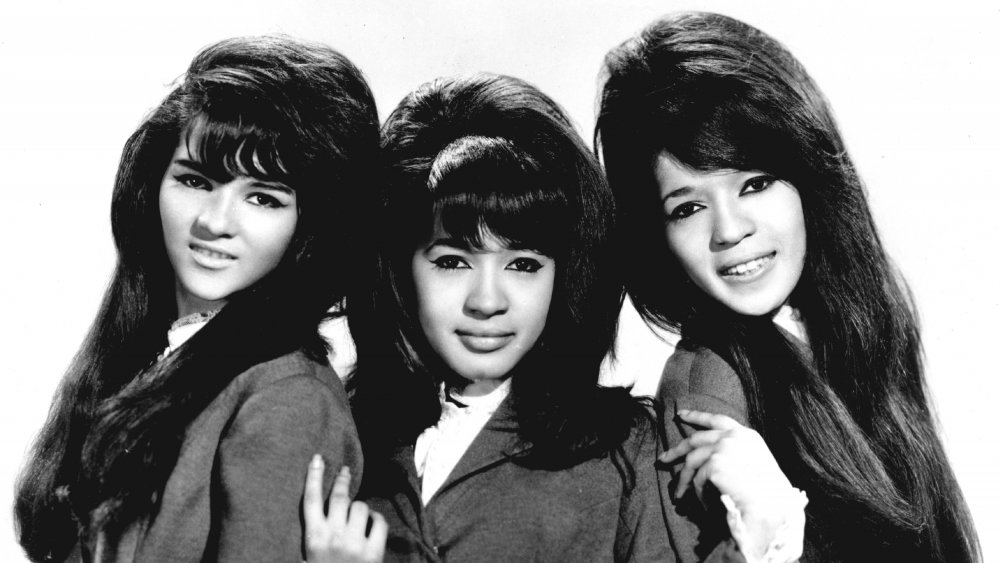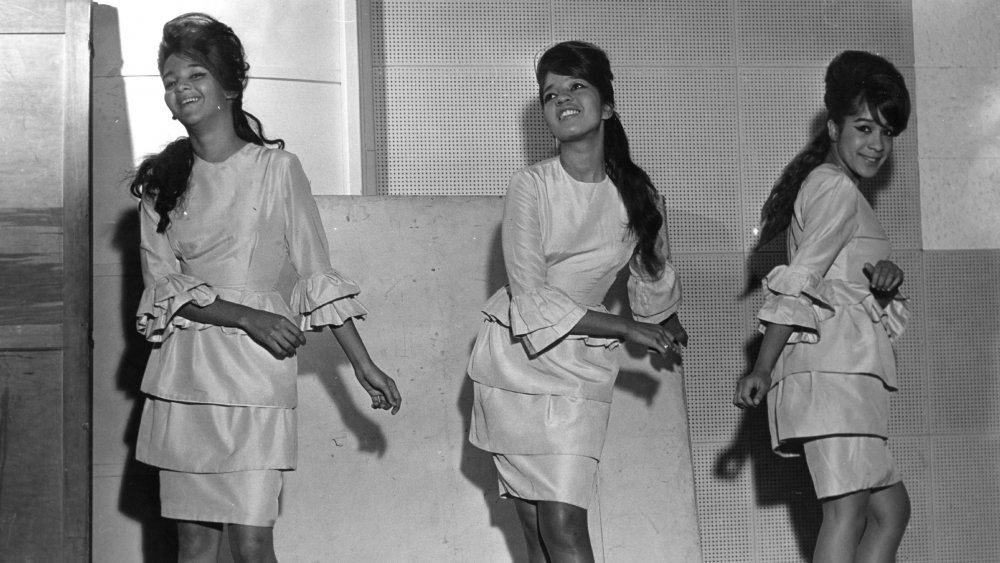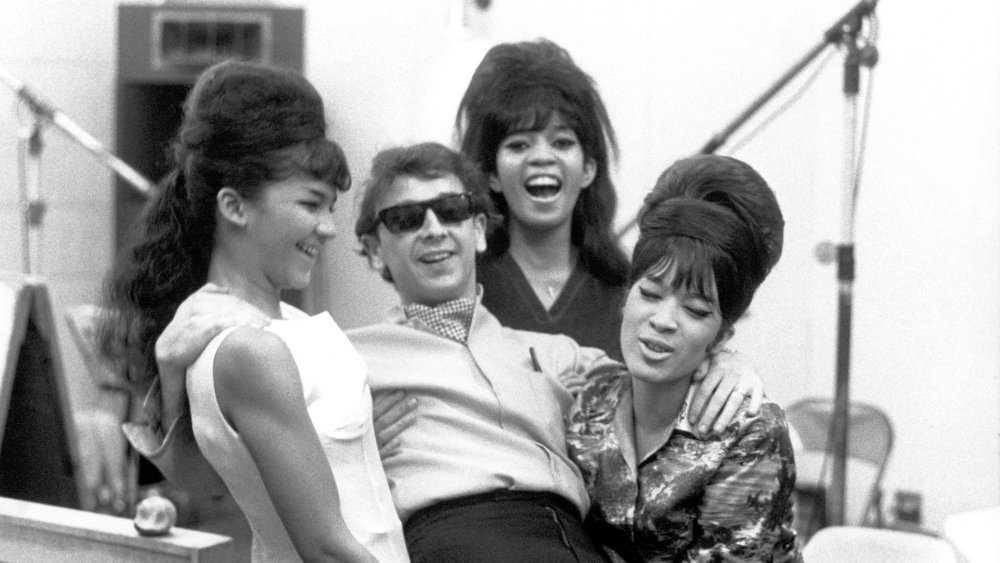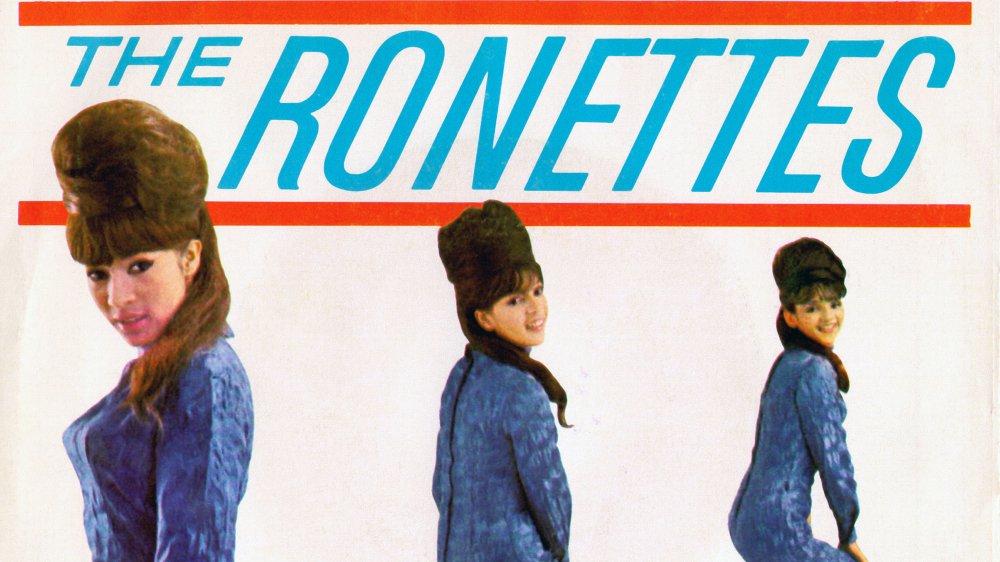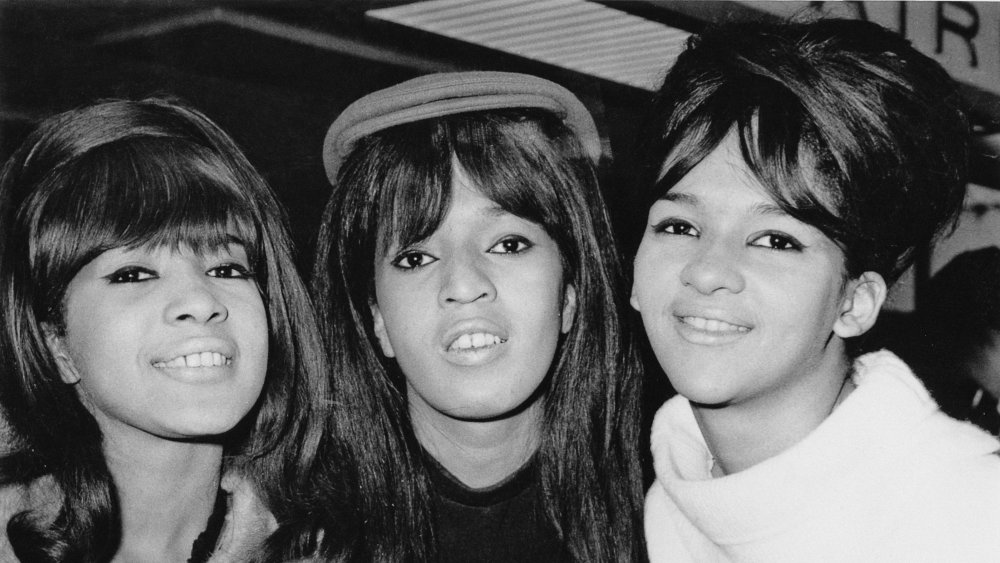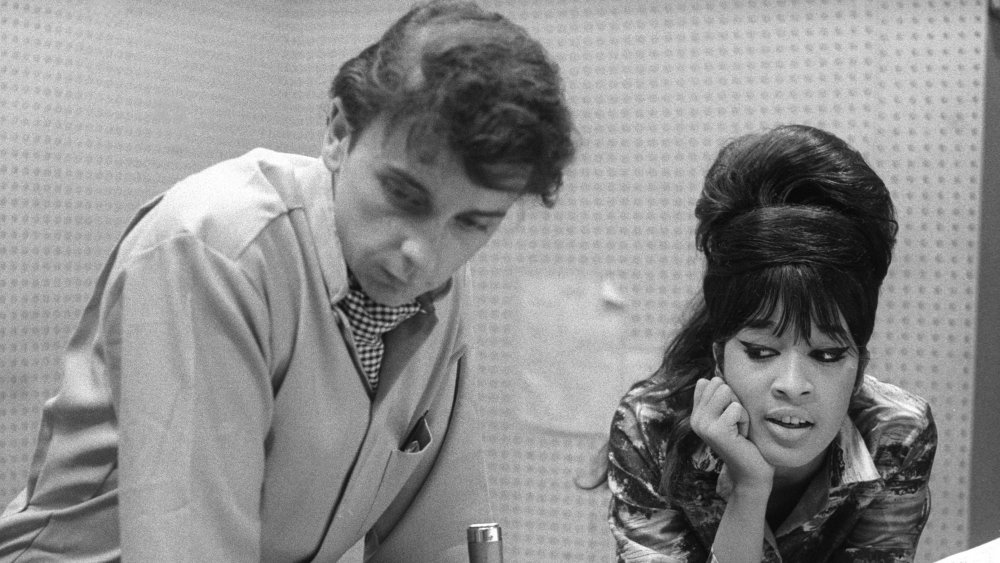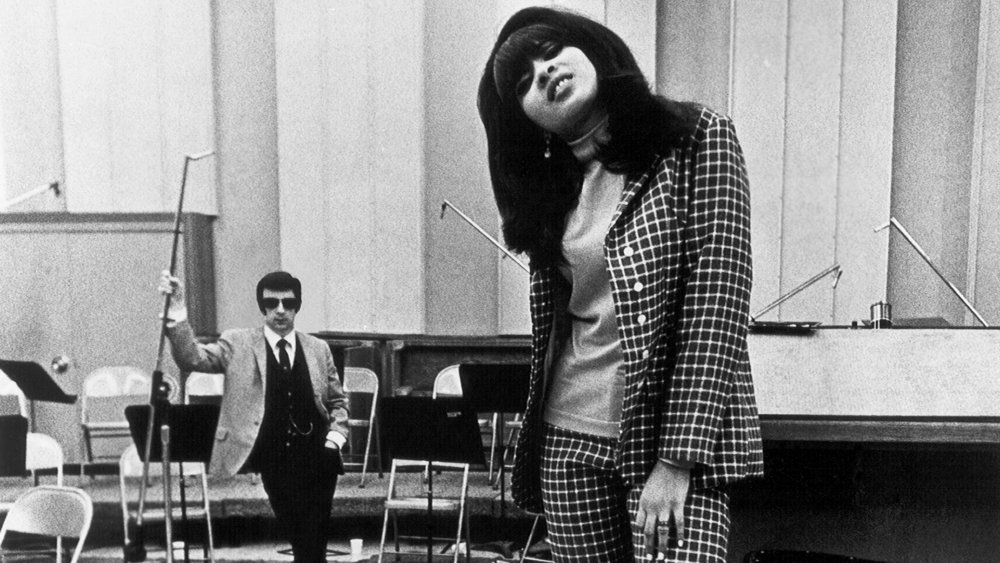The Untold Truth Of The Ronettes
The mid-1950s saw the emergence of rock and roll as this new, dangerous genre of music that "corrupted" the youthful baby boomers. This "dangerous" new music was sexually explicit, broke color barriers as its origins were found in African American rhythm and blues, and the genre seemed to disregard the morals of the time.
But, it made money, so it became commercialized. By the decade's end, many of these "dangerous" early musicians either suffered tragic deaths like Buddy Holly and Eddie Cochran or were swallowed in controversies like Jerry Lee Lewis and Chuck Berry. Artists like Elvis Presley appealed to executives because his appearance could be easily marketed, per Britannica. Thus, the teen idol was born and would dominate the US until 1964 when new groups like The Beatles and The Rolling Stones crossed the Atlantic from England.
During this period between Elvis' hips and Mick Jagger's lips, teenage doo-wop groups from New York found great success. No group was able to bridge the two separate periods of rock music quite like Ronettes. A mixed-race girl group with sex appeal that sang both ballads and rock music checked every taboo box. Produced by one of the most influential artists of the generation, the Ronettes shot to the top of the music world like a comet, then disappeared almost just as fast. Their story has left many untold chapters, so here is the untold truth of the Ronettes, the original bad girls of rock.
The Ronettes were a family affair
Like the Jackson 5, the Ronettes were a family affair — made up of sisters Estelle and Veronica "Ronnie" Bennett and their cousin, Nedra Talley. The three were born and raised in New York City, which was fitting because their background was a melting pot. According to Biography, Estelle and Ronnie Bennett's father was Irish and their mother was of African American and Cherokee descent. Pop History Dig says that Nedra Talley came from a Black, Indian, and Puerto Rican background. According to the People Pill, Estelle and Ronnie were bullied at their school for being mixed race.
In an interview with NPR, Ronnie Spector (then Bennett) talked about her extended family's interest in music and growing up in Spanish Harlem. "I had so many first cousins, and I remember being on the rooftop, rehearsing, and trying to get our routines together," Spector said. "I grew up in Spanish Harlem, which was terrific because it was, like, every race, every color, every language."
During her youth, Ronnie Bennett remembered enjoying the music that was played in her home, particularly Sam Cooke. Coming from a big family, many family members were either involved or trying to break into the music business. At the insistence of their mother and grandmother, the three girls began to take music more seriously and learned to sing together as a unit. Eventually, the ladies began to compete in local competitions and became well-known in their neighborhood even before graduating high school.
The Ronettes find early success with Phil Spector
According to All Music, the Ronettes were influenced by doo-wop groups at the time such as Frankie Lymon & the Teenagers and Little Anthony & the Imperials. The group worked on their choreography and, calling themselves "The Darling Sisters," won a competition at the Apollo Theatre in the late 1950s, which led them to receive formal vocal training. Two years later, the Ronettes' big break came by accident. In 1961, while waiting in line to get into a popular club called The Peppermint Lounge, the club's manager mistook them for the night's performers. The ladies took advantage of the mistake and by the end of their show, were made regulars at the Peppermint.
That same year, the group signed with Colpix Records and began to release music that was regionally popular. This changed with one faithful plan and phone call. According to Rock and Roll Paradise, Estelle and Ronnie Bennett got the idea to call notable producer Phil Spector, who had just produced a hit with another girl group, the Crystals. Spector and fellow producer Lester Sill founded Philles Records in 1961, as reported by Biography, and agreed to meet with the Ronettes. He signed the group and helped them develop their iconic style. The group sported a large beehive haircut, tight skirts and dresses, and thick eyeliner, distinguishing them from the other female performers of the time period. The appearance projected both femininity and a "bad girl" look they saw on New York City streets.
The Ronettes instantly peaked
With the production of Phil Spector and the appeal of the three ladies, the early 1960s became the height of the Ronettes' popularity. Spector's "Wall of Sound" technique, as described on NPR, used a number of musicians doubling and even tripling instruments and featured an echo chamber and special amplifiers to create and enhance a reverb sound.
In late 1963, the group released their first single with Spector, "Be My Baby." The song, as described by Britannica, was a "wall of sound masterpiece," peaked at #2 in the country, and Rolling Stone placed it at #22 on their list of the 500 Greatest Songs of All-Time. Next, the ladies also took part in a Christmas album, featuring other Spector-produced acts. Their versions of "Frosty the Snowman," "Sleigh Ride," and "I Saw Mommy Kissing Santa Claus" all became Holiday staples.
Their 1964 debut album, Presenting the Fabulous Ronettes Featuring Veronica saw four more singles reach the top 40. Against the British Invasion that was taking control of the pop charts, the ladies held their own. And Ronnie Bennett, the group's lead vocalist, was distinguishing herself with her voice. Described by NPR as, "more free, less restrained" and "untrained rather than classically molded," her voice would influence many vocalists for generations, such as New York punk singers Joey Ramone and Patti Smith, Rolling Stone reports. Ronnie Spector said she saw the music as more rock than pop and unlike other girl groups, the group did not shy away from their sex appeal.
The Ronettes were friends with the Beatles and Rolling Stones
Even before the Beatles or the Rolling Stones toured in the United States, the Ronettes were familiar with their work. According to Teach Rock, in January of 1964, the trio traveled to England for a series of shows and had the Rolling Stones opening for them. During this trip, the group spent time with their opening act, as well as the Beatles, who would travel to the US the next month.
According to People, the Beatles and Ronettes met up at a show-business party in London. During the party, John Lennon and Ronnie Bennett became quick friends and remained so until his murder in 1980. This was despite the fact that Lennon initially tried to seduce the lead singer, to which she shut down quickly. Still, Lennon acted as a chaperone to Ronnie whenever she toured the UK.
Her sister, Estelle, hit it off with the Beatles' other guitarist, George Harrison. As reported by the Weekly View, the quiet Beatle and quiet Ronette became a couple for a short period, but their rising careers and constant travels ended the relationship. Brian Epstein, the Beatles' manager, feared that there would be a backlash in England because they were an interracial couple. In his 2010 autobiography, Life, Keith Richards said that he also had a relationship with Ronnie, and Mick Jagger had a relationship with Estelle as well.
Two years later, the Ronettes opened for the Beatles in what would be both group's final tour before splitting up.
The Ronettes' decline and break up
During 1966, the Ronettes' popularity had begun to wane as popular music was leaving behind the doo-wop sound of the early-1960s in favor of the heavier rock and psychedelic sound coming from California and England. Despite agreeing to tour with the Beatles during 1966, the group's future relied on another female singer outside of the group. Phil Spector had largely ignored the Ronettes while producing a song for Tina Turner using the wall of sound technique.
Spector, according to Michael Billig's book, Rock 'n' Roll Jews, had put as much as he could emotionally into his track with Tina Turner, believing it would be a success. According to the Independent, the session musicians were unenthusiastic and Turner, from exhaustion, had stripped down to her underwear during recordings. When the song, "River Deep -Mountain High" was released, it was a flop in the United States, though it was a hit in England. Though the song is seen today as a masterpiece, Spector was disheartened and retired from the industry.
While working with Turner, Spector largely ignored the Ronettes, whose 1965 singles failed to reach the top 40 and released only one single the next year with a different producer. Spector, who had been in a relationship with Ronnie Bennett, forced her to retire as well, ending the band in the process in 1967. According to the History of Rock, that same year, both Nedra Talley and Estelle Bennett got married and Phil and Ronnie would marry in 1968.
Nedra Talley leaves rock for Jesus
According to the Virginia Pilot, in 1962, Nedra Talley met Scott Ross, a New York deejay. The pair spent the next four years dating on and off, as Talley focused on her rising success with the Ronettes. Still, in 1966, the pair visited his family in Maryland where the two would devote themselves to Christianity after an impactful church service.
Talley, in an interview with CBN, described how her grandmother's death affected her relationship with the church. "My grandmother died just before I turned 14, and it was a big hit to our family because she really was that anchor," Talley said. "We had her funeral at the church that we belonged to, and literally, we could not go back because there were too many memories."
Nedra Talley also detailed how important her family was throughout her career, traveling with them and chaperoning them away from any troubles that many rock stars experience. Per the Virginia Pilot, the couple became involved in the evangelical Jesus Movement of the 1960s and, after meeting popular minister Pat Robertson, began working for the Christian Broadcast Network.
After the Ronettes' breakup, Talley left music altogether. She and Scott Ross got married and had four children. In the late 1970s, Nedra worked on an album by Christian artist Ted Sandquist before releasing her only solo album, Full Circle. The Daily Press reported that Talley lives in Virginia Beach where she works as a businesswoman in real estate.
Ronnie and Phil Spector's troubled marriage
In many ways, Phil Spector's production and songwriting helped make the Ronettes one of the greatest acts of the era, like Ike Turner in his partnership with his then-wife, Tina Turner. And similar to Ike, Phil Spector was, according to Ronnie Spector, an abusive and controlling man. Their marriage lasted six years and left a great scar on Ronnie Spector.
According to The Guardian, Phil Spector sabotaged the group's career, even at its commercial heights, by not letting the trio travel with the Beatles during the peak of Beatlemania in the United States in 1964. During their marriage, Ronnie was kept a prisoner in their mansion. Phil set up chained-link fences, barbed wire, and an intercom system to control his wife's movements. When she was allowed to leave their home, he required her to drive around with an inflatable version of himself in the passenger seat. All this, combined with severely limiting her musical career, led Ronnie Spector to drink.
People magazine reported that Phil Spector adopted twins without consulting his wife as a Christmas present and threatened her with a glass coffin he purportedly kept in his basement. Finally, in 1972 with her mother's assistance, Ronnie escaped the mansion and her husband. The NY Daily News reported that the settlement agreed upon in 1974 gave Ronnie only $25,000, a used car, and $2,500 alimony for five years. Any royalties from the Ronette stayed with Phil, though Ronnie and the other Ronettes would sue Spector years later for royalties.
Ronnie's life after Phil Spector
Finally free from Phil, Ronnie Spector hoped to pick up her career again. According to Black Past, Ronnie spent the 1970s and 80s working with a variety of acts, such as Bruce Springsteen, Billy Joel, and her old friend from the Beatles, George Harrison. Spector also brought the Ronettes back with new backup singers. However, her greatest commercial success came in a duet with Eddie Money on the 1986 track, "Take Me Home Tonight."
Friends and colleagues in the industry attempted to help Spector revitalize her career, such as popular disc jockey Murray the K and television host Dick Clark. In 1974, she signed with Buddha Records, though, per Encyclopedia, Spector retreated from the spotlight again following a death threat from her ex-husband. In the late 1970s, she opened for Bruce Springsteen and the E Street Band, whose guitarist Steven Van Zandt produced her cover of the Billy Joel song, "Say Goodbye to Hollywood." Joel said he wrote the song specifically in the style of the Ronettes.
In 1982, Spector married Jonathan Greenfield. The pair is still going strong and has two sons. With her husband's support, Spector relaunched her music career to some success in the 1980s and '90s. Ronnie and the other original Ronettes sued Phil Spector for "coercive tactics to withhold royalties" from them. After more than a decade in the courtroom and an appellate court decision, in 2002, the New York Times reported the trio would receive far less than what they desired.
Estelle Bennett's struggle with mental illness
During the group's popularity, according to the New York Times, Estelle Bennett was looked at as the quiet and the prettiest of the Ronettes. Estelle attended the Fashion Institute of Technology and helped develop the look of the group. She had a number of high profile suitors such as George Harrison, Johnny Mathis, and Mick Jagger. However, after the band's breakup, Estelle's life saw her struggle with mental and physical diseases.
Her cousin, Nedra Talley, remembered an early sign of Estelle having trouble handling stressful situations in 1959 when their grandmother passed away. She recalled Estelle screaming and believing she "would never go on." This scene would be played out again following the Ronettes' breakup. Estelle was "devastated" by the band's breakup. Like the other ladies, Estelle got married shortly after the break, to their road manager Joe Dong. In 1968, she released her first solo song, "The Year 2000."
Soon after, Estelle's mental illness began to take more control of her life. During her life, she had to be hospitalized for anorexia and suffered from schizophrenia. Estelle's only child, Toyin, had first-hand experience with trying to live with her mother. During a discussion about her late mother to a Brooklyn Women's Shelter, she said, "All my life, my mother was swallowed by mental illness."
Estelle Bennett would struggle, even becoming homeless for a time, before passing away in 2009 from colon cancer at the age of 67.
Phil Spector lashes out at the Ronettes
After his work with Tina and Ike Turner failed commercially in the United States, Phil Spector went into early retirement. He returned for a brief period to work on the Beatles' Let It Be and the solo albums of John Lennon and George Harrison, but left soon afterward to live off his royalties, only working occasionally over the next three decades.
According to CNN, after Ronnie Spector left, he mostly lived in seclusion in his California mansion. In February of 2003, the reclusive producer was thrown back into the public eye when actress Lana Clarkson was found murdered in his home. Following the murder, Spector's private life was examined with a microscope. His adopted children, Donte and Gary Spector, detailed abusive behavior from Spector. Reported by the NY Daily News, in treatment similar to what Ronnie Spector had spoken about, the boys were allegedly forced to stay prisoners in Spector's mansion that was fortified with barbed wire and guards. That November, Spector was charged for Clarkson's murder.
In 2007, Spector voiced criticism at the Ronettes being inducted to the Rock and Roll Hall of Fame. Ronnie Spector only had this to say about her ex-husband: "He's an angry and unhappy man, and he hasn't been successful since I left." Two years later, Spector was found guilty of second-degree murder and sentenced to 19-years to life in prison.
The legacy of the Ronettes
While the Ronettes' time in the spotlight was short, their music and style have left a legacy that has outlived the Swingin' 60s. Artists such as Billy Joel, Kirsty MacColl, and Amy Winehouse (whose iconic beehive hairstyle was based on the group) drew influence from the Ronettes, as told by Get Into This.
In an interview with the Chicago Tribune, Ronnie Spector discussed just some of the impact that the Ronettes had on the music industry. "We brought attitude into rock 'n' roll for women — passion, and stylistically we brought the look of the street to the stage before anyone else did," Spector said.
Their first hit song, "Be My Baby," was added to the Library of Congress National Recording Registry in 2006 and named the Greatest Girl Group Song of All-Time by Billboard. Both albums that featured the trio were listed on Rolling Stone's 500 Greatest Albums of All-Time. In September of 2020, according to Variety, A24 and New Regency announced that they had acquired the rights to Ronnie Spector's life and her 1990 autobiography, Be My Baby, and are planning to make a biopic about the singer, with Zendaya playing the lead role of Ronnie Spector. With less than five years in the spotlight, the story and music of the Ronettes are still producing aftershocks in pop culture.
